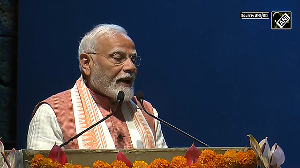Gregory Mankiw, chairman of the White House Council of Economic Advisers, reiterated on Tuesday that he never praised American job losses to countries like India.
Mankiw's defense of outsourcing last week created a furor with some Republican Congressional leaders calling for his resignation, while Democrats, including those on the presidential campaign trail slammed President Bush for condoning the flight of jobs overseas, including to India.
Outsourcing and India: Complete Coverage
But in a speech on the latest Economic Report of the President at the Chinatown Garden Restaurant in Washington DC, the Harvard-trained Mankiw whose text books on economics have sold over two million copies, strongly defended free trade and warned against isolationism and protectionism and predicted dire consequences if America adopted such policies.
Mankiw said, "I made some news last week with some injudiciously worded comments about international trade," and acknowledged that "I learned an important lesson from that experience -- economists and non-economists speak very different languages."
He said, "The two languages share many words in common, but they are often interpreted in different ways. Last week, some comments I made about the benefits of international trade were far from clear, and were misinterpreted to suggest I was praising US job losses. Nothing could be further from my views."
"Creating an environment for robust job creation is a paramount goal of the President and his economic team," Mankiw emphasised.
While releasing President George W Bush's annual report last week, Mankiw, defended outsourcing, saying it was "the latest manifestation of the forces of free trade and increasing international specialisation in production," and predicted that "it is probably a plus for the economy in the long run."
But when all hell broke loose and the White House spokesman Scott McClellan also started backtracking, Mankiw apologised in a letter to Republican House Speaker Dennis Hastert of Illinois, who was among some GOP (Grand Old Party or the Republican Party) lawmakers too were aghast at Mankiw's statements in an election year when unemployment and concern over outsourcing is a hot political potato, saying his comments had been misinterpreted.
Democrats, including Senate Minority Leader Tom Daschle of South Dakota, had dismissed Mankiw's theory as "Alice in Wonderland economics" and joined by the likes of Senator Hillary Rodham Clinton of New York took President Bush to task saying it was his economic report after all that was condoning outsourcing.
But Mankiw argued that "free markets remain the best way to promote growth, create good jobs and ensure rising living standards. That is why the President has actively sought to open markets."
He noted that "some would respond to the recent challenges facing the economy by erecting trade barriers," and warned that "history teaches that a retreat to economic isolationism is a recipe for economic decline."
Mankiw recalled the "Smoot-Hawley tariffs of the 1930s," and pointed out how they "contributed to the hardship of that period."
He said that changes in the world trading system was occurring "largely because of the Internet and advances in telecommunications. We all used to goods being produced in one country and transported to another on ships or planes."
"We are less used to services being produced in one country and sent to another over fiber optic cable. Advances in technology have expanded the range of commercial activities," he said.
Mankiw said, "Although it is impossible to say precisely what changes lie ahead for the US economy, it is important to harness the forces of change for the betterment of all Americans."
He spoke of how over the past half century, "new technology led to great advances in farm productivity. The number of Americans working on farms declined from almost 20 per cent of the workforce in 1940 to about 2 per cent today.
"In 1940, no one could have predicted that some of the grandchildren of farmers would become website designers and CAT scan operators. But they did, and at much higher wages and incomes."
Mankiw conceded that "farming remains a vital sector of the economy, but we would be far poorer today if public policy in 1940 had stifled the forces of change in order to keep 20 percent of Americans on farms."
However, in an environment when both Democrats and Republicans, particularly lawmakers faced with thousands of constituents who have lost their jobs, have made outsourcing the scapegoat and are demanding termination of trade agreements and a ban on BPO, Mankiw, sensitive to the politically charged climate said, while "we recognise the gains from free and open markets, we must appreciate that any economic change, whether arising from trade or technology, can cause painful dislocations for some workers and their families."
Thus, he declared, "Public policy should help workers prepare for the global economy and the jobs of the future," and he claimed Bush's policies "are aimed at doing exactly that."
Mankiw then went on to tout the President's "Jobs for the 21st Century," initiative, which he asserted would "help prepare US workers to take advantage of better skilled, higher paying jobs."
"Among other programs, his strong support for community colleges, where much training takes place, is an important part of helping workers gain new skills," he added.
Mankiw predicted that "in the years ahead, the creativity of the American people and their spirit of entrepreneurship will continue to lead to higher living standards for all American families."






 © 2025
© 2025